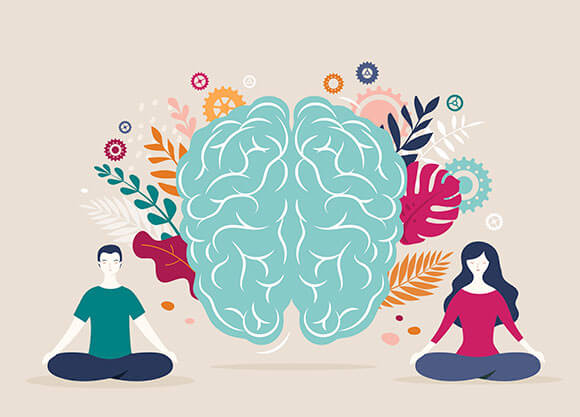
University leaders share tips and tricks for finals week
December 10, 2021

December 10, 2021

Ariela Reder, director of counseling services, and Tamarack Reilly, director of fitness and well-being, urge students to stay mindful and try to focus on the present.
“It enriches each experience and allows us to fully engage in what is going on," said Reilly. "Whether it is studying or enjoying a final meal with your friends, put down your phone or whatever ever else is distracting you and embrace the moment with your full presence."
Students are encouraged to take a deep breath when stressed and to take regular breaks, Reder and Reilly agree.
“Eating right to fuel your brain and body, getting sleep so you can focus and think clearly, watching your caffeine intake, getting up and stretching when you have been sitting for a long time, making time for a little movement to clear your mind — as simple as walking the hallway of your dorm for a few minutes to a brisk walk outside to making time for a fitness class — are all beneficial to your brain and body," said Reilly.
Students are urged to make a list to create a plan to most efficiently complete assignments. Having a positive affirmation could also help students feel and remain more positive, she said.
“I like to write it on Post It notes and display them on my bathroom mirror, by my bed, on my phone, anywhere and everywhere to remind me that I are capable," Reilly said. "Some examples are I study hard today so that my tomorrow becomes easy or every day in every way I am getting better and better at my studies."
It's also important to learn to say "no," she said.
"Make time for fun," Reilly said. "Don’t take on more than you can handle and make sure to budget time to relax and have fun."
Limit alcohol consumption and don't forget to get enough sleep, Reder added.
"Reconnect with the people you care about, get some exercise and don’t overextend yourself," she said.
As students move into the new semester, Reilly recommends that students view it as a fresh start.
“With the long break that we get, there is an opportunity for you to create a new routine and habits which can benefit your mental and physical well-being moving into the spring semester," she said. "While on break, sit down and make a list of what you are currently doing for self-care, a list of things you should be doing for self-care and a list of what you enjoy doing or can easily add for self-care."
Self-care includes caring for your physical and mental health, spirit, friendships and social interactions, financials, and education, Reilly and Reder agreed. They urged students to determine which areas will benefit them and practice incorporating them into their routines.
“Creating healthier and more productive habits requires intention and daily practice," said Reilly. "Making quality time for yourself is not easy and can feel indulgent, but you are worth it."
Reflect on going home, they said, whether it be positive or negative
“For students for whom going home is a positive experience I would recommend enjoying the break, connecting with your loved ones and recharging. Do what you enjoy and focus on self-care," said Reder.
She suggested:
Reflect on how you are affected by the family dynamic and learn to recognize the feelings as they occur.
Name these feelings and reactions to prepare to work through them. Set yourself up to be prepared and not reactive.
Utilize breathing and grounding techniques before and during interactions
Try to remind yourself that you are now an adult and interact with your family from this position rather than reverting to your child self.
Quinnipiac Today is your source for what's happening throughout #BobcatNation. Sign up for our weekly email newsletter to be among the first to know about news, events and members of our Bobcat family who are making a positive difference in our world.
Sign Up Now